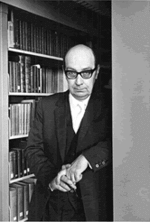No subscription or hidden extras
Read through all quotes from Philip Larkin
The view that Larkin is not a nihilist or pessimist but actually displays optimism in his works is certainly not universally endorsed but Chatterjee's lengthy study suggests the degree to which old stereotypes of Larkin are now being transcended. On the other hand the revelations were dismissed by the novelist Martin Amis in The War Against Cliché arguing that the letters in particular show nothing more than a tendency for Larkin to tailor his words according to the recipient. Brett who was chairman of the library committee who appointed him and friend until Larkin's death wrote "At first I was impressed with the time he spent in his office arriving early and leaving late.
Lisa Jardine called him a "casual habitual racist and an easy misogynist" but the academic John Osborne argued in 2008 that "the worst that anyone has discovered about Larkin are some crass letters and a taste for porn softer than what passes for mainstream entertainment". Despite the controversy Larkin was chosen in a 2003 Poetry Book Society survey almost two decades after his death as Britain's best-loved poet of the previous 50 years and in 2008 The Times named him Britain's greatest post-war writer. After graduating from Oxford in 1943 with a first in English language and literature Larkin became a librarian.

